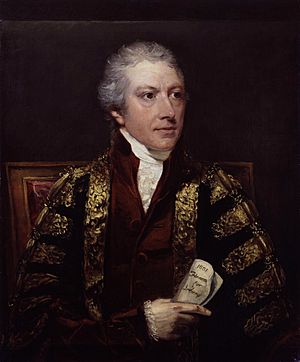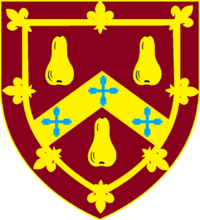Charles Abbot, 1st Baron Colchester facts for kids
Quick facts for kids
The Lord Colchester
|
|
|---|---|

Lord Colchester by John Hoppner, c. 1802 (Palace of Westminster)
|
|
| Speaker of the House of Commons of the United Kingdom |
|
| In office 10 February 1802 – 2 June 1817 |
|
| Monarch | George III |
| Preceded by | Sir John Mitford |
| Succeeded by | Charles Manners-Sutton |
| Personal details | |
| Born | 14 October 1757 Abingdon |
| Died | 8 May 1829 (aged 71) |
| Nationality | British |
| Political party | Tory |
| Spouses | Elizabeth Gibbes (1760–1847) |
| Alma mater | Christ Church, Oxford |
Charles Abbot, 1st Baron Colchester (born October 14, 1757 – died May 8, 1829) was an important British lawyer and politician. He is best known for serving as the Speaker of the House of Commons from 1802 to 1817. The Speaker is like the referee in the main part of the British Parliament, making sure debates run smoothly.
Contents
Early Life and Education
Charles Abbot was born in Abingdon, England. His father, Dr. John Abbot, was the headmaster of Abingdon School. Charles also had a famous step-brother, Jeremy Bentham, who was a well-known thinker.
School Days and University
Charles went to Westminster School, a famous school in London. After that, he went to Christ Church, Oxford, a college at the University of Oxford, in 1775. While at Oxford, he won a special award for his Latin poetry. He also earned a scholarship for law students.
Becoming a Lawyer
He began studying law in 1768. By 1783, he officially became a qualified lawyer. He earned degrees in law in 1783 and 1793. In 1793, he also became a member of the Royal Society, a very old and respected group for scientists.
Political Career and Reforms
Charles Abbot worked as a lawyer for twelve years. In 1795, he got a job working in the King's Bench, which was a high court. That same year, he was elected as a Member of Parliament for Helston. This meant he became a representative in the British Parliament.
Making Laws Better
In 1796, Abbot started working to improve how laws were made and shared. He helped set up committees to look at laws that were about to expire. He also worked to make sure new laws were properly published. Thanks to his efforts, copies of new laws were sent to all local leaders and town councils.
Important Changes He Made
Abbot also helped create the Record Commission. This group was set up to look after important government documents. He also changed how public money was managed. Before him, public officials could keep government money for a long time and earn interest on it. Abbot made sure they had to pay interest back to the government.
Perhaps his most famous achievement was helping to pass the act for taking the first census of the United Kingdom. This law led to the first official count of everyone living in the UK in 1801. A census helps the government understand its population better.
Becoming Speaker of the House
In 1801, Abbot became the Chief Secretary for Ireland, a key government role. The next year, in February 1802, he was chosen to be the Speaker of the House of Commons. He stopped being Chief Secretary for Ireland but continued to hold another important role, Keeper of the Privy Seal of Ireland, until he died.
He served as Speaker for many years, until 1817. He had to retire because of an illness. The House of Commons Library, which is a library for Members of Parliament, started during his time as Speaker.
Later Life and Honors
After he retired, the House of Commons honored him. He was given a special title, Baron Colchester, in 1817. This meant he became a peer, a member of the nobility. He also received a pension, which was a regular payment, for his service. His speeches against certain rights for Roman Catholics were published in 1828.
Family Life
|
In 1796, Charles Abbot married Elizabeth Gibbes. They had two sons together. His older son, Charles, became the 2nd Baron Colchester after his father passed away. The title eventually ended when his grandson, Reginald Abbot, the 3rd Baron Colchester, died in 1919.
 | Mary Eliza Mahoney |
 | Susie King Taylor |
 | Ida Gray |
 | Eliza Ann Grier |



